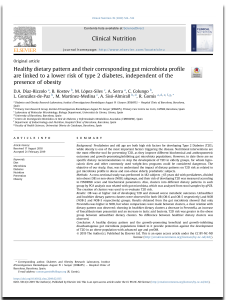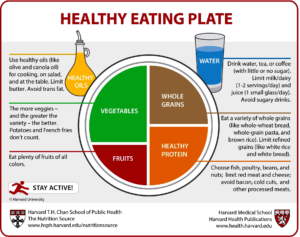The quality of the diet is as important, if not more than weight
When food choices are right, being obese does NOT increase the risk of type 2 diabetes
Being diagnosed with type 2 diabetes and suffering from obesity was, at least until now, a tight relationship. So much so that the threat of “if you keep this up you will end up with diabetes” has been common among the various warnings that can be directed at anyone who is overweight. In fact, as we have already told here, it is very difficult to avoid the temptation to observe the incidence of obesity and diabetes cases in the last decades and not end up establishing a cause and effect relationship: the more overweight the more risk of diabetes. So much so, that the first recommendation, above any other that comes later and that is addressed to every patient with type 2 diabetes is usually, always: reduce your weight.
 Well, we may be skipping a step in between, which would be one that could help us understand the true risk factors for type 2 diabetes. I am speaking about the quality of the diet. A recent publication ‘Healthy dietary pattern and their corresponding gut microbiota profile are linked to a lower risk of type 2 diabetes, independent of the presence of obesity’ . In this study, 182 patients over 65 years of age who met the criteria of “pre-diabetes” participated. In addition to their weight, the participants’ different dietary patterns were evaluated to compare the extent to which those patterns might influence the risk of diabetes. Four groups were formed: patients with obesity who followed a healthy diet, patients with obesity but with an unhealthy diet, normal-weight patients with a healthy diet, and normal-weight patients with an unhealthy diet.
Well, we may be skipping a step in between, which would be one that could help us understand the true risk factors for type 2 diabetes. I am speaking about the quality of the diet. A recent publication ‘Healthy dietary pattern and their corresponding gut microbiota profile are linked to a lower risk of type 2 diabetes, independent of the presence of obesity’ . In this study, 182 patients over 65 years of age who met the criteria of “pre-diabetes” participated. In addition to their weight, the participants’ different dietary patterns were evaluated to compare the extent to which those patterns might influence the risk of diabetes. Four groups were formed: patients with obesity who followed a healthy diet, patients with obesity but with an unhealthy diet, normal-weight patients with a healthy diet, and normal-weight patients with an unhealthy diet.
Of all the groups, it was found that in those in which following a healthy diet was a common feature, the fact of being obese did not increase the risk of type 2 diabetes. En sentido contrario, de entre los dos grupos con la dieta no-saludable, el grupo que presentaba además obesidad, si que ofrecía una probabilidad aumentada de padecer diabetes tipo 2. In short, when food choices are appropriate, suffering from obesity will NOT increase the risk of type 2 diabetes; but I would increase it the moment the diet was inappropriate.
The link between type 2 diabetes and the intestinal flora

It has long been known that one’s dietary style has a significant impact on the ecosystem of one’s intestinal flora. Therefore, in this study the characteristics of the microbiota of the participants were observed at the same time. Thus, it was noticed that in the two groups that shared a better dietary style – whether they were overweight/obese or not – their pattern of bacteria was healthier, than in those two other groups that followed worse dietary habits.
It is more than possible that the nature of the intestinal flora is behind, along with other factors and to some extent, the risk of suffering from type 2 diabetes. In fact, recent research has converged on this line. For example, the recent review of the scientific literature ‘Role of gut microbiota in type 2 diabetes pathophysiology’ concluded that there are certain bacteria (those belonging to the genera Bifidobacterium, Bacteroides, Faecalibacterium, Akkermansia and Roseburia) whose presence is associated with a lower risk of type 2 diabetes; versus.
With respect to the mechanism by which this may be possible, there is considerable scientific literature today that suspects that certain different microbial strains may protect, at best, or destroy, at worst, what are known as the “narrow joints” of the intestinal epithelium (read this publication or this other one).
To explain it quickly, the “narrow unions” are structures that join some cells to others and that somehow (by virtue of their presence, absence and number) regulate the passage of substances between a cellular layer, in this case that of the intestinal epitheliuml. It is proposed that a negative environment in terms of intestinal flora would lead to the destruction of these structures, which would facilitate the passage of materials from the intestinal lumen to the internal environment, which is a circumstance that is related to insulin resistance (one of the defining characteristics of type 2 diabetes). On the other hand, a positive intestinal flora (to a certain extent promoted by adequate dietary habits) would favour the increase of these “close links” thus decreasing the risk of type 2 diabetes.
 Is it a new approach to diabetes recommendations?
Is it a new approach to diabetes recommendations?
Whatever the link of the intestinal flora, or its role in increasing the risk of type 2 diabetes, the authors of the above-mentioned study agree that in light of these findings a new possibility opens up in the recommendations.
So much so that the authors themselves raise the possibility that in the case of people aged 65 or older with pre-diabetes, the classic personalized recommendations on restrictive diets for weight loss may not be the best option. The reason is that, especially in this group, restrictive weight-loss diets are quite often associated with other important potential risks, such as sarcopenia, functional impairment, malnutrition (and its deficiencies), and frailty. Therefore, they advocate, in this age group before any other, the promotion of a true healthy eating style instead of focusing on weight reduction. This implies, as has been commented on several occasions in this channel, the recommendation to include a wide range of vegetable foods (vegetables and fruits), legumes and nuts, olive oil as an added fat and other foods that are a source of healthy fats
Latest posts by Juan Revenga Frauca (see all)
- Obesity recognized as a chronic disease - 13 October, 2021
- Who said you have to eat everything? - 7 October, 2021
- Diabetes and Alzheimer - 29 January, 2021








